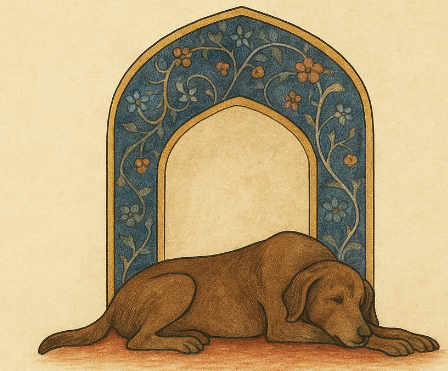Subscribe to our newsletter for the latest updates, exclusive promotions, and valuable insights.
Dogs: Creatures of Loyalty, Not Filth
Dogs: Creatures of Loyalty, Not Filth

Why are dogs seen as impure in Islam when the Qur’an never says so? This question challenges a long-standing cultural perception that has little to no foundation in divine revelation. When we return to the Qur’an, the central and unquestionable source of Islamic guidance, we find that dogs are not only present but treated with respect and purpose.
One of the most striking examples is found in Surat Al-Kahf where God narrates the story of a group of young, faithful believers who sought refuge in a cave. Alongside them was their loyal dog who guarded the entrance while they slept for many years. This dog is not scolded nor is its presence portrayed as unclean or problematic. On the contrary it is honored alongside these righteous servants of God. If dogs were inherently filthy or religiously problematic why would God include one in such a sacred narrative?
Furthermore the Qur’an explicitly permits the use of trained dogs for hunting in Surat Al-Ma’idah. The verse clearly states:
“They ask you what is lawful for them. Say, ‘Lawful for you are [all] good foods and [game caught by] what you have trained of hunting animals which you train as Allah has taught you. So eat of what they catch for you and mention the name of God upon it.’” –
يَسْأَلُونَكَ مَاذَا أُحِلَّ لَهُمْ ۖ قُلْ أُحِلَّ لَكُمُ الطَّيِّبَاتُ ۙ وَمَا عَلَّمْتُم مِّنَ الْجَوَارِحِ مُكَلِّبِينَ تُعَلِّمُونَهُنَّ مِمَّا عَلَّمَكُمُ اللَّهُ ۖ فَكُلُوا مِمَّا أَمْسَكْنَ عَلَيْكُمْ وَاذْكُرُوا اسْمَ اللَّهِ عَلَيْهِ ۖ وَاتَّقُوا اللَّهَ ۚ إِنَّ اللَّهَ سَرِيعُ الْحِسَابِ
In this context dogs are not only allowed but are tools of sustenance guided by divine permission. There is no warning about contamination or spiritual harm. There is only acknowledgment of their role and God’s approval.

The Qur’an beautifully acknowledges a dog’s behavior in Surat Al-Kahf 18:18: “وَكَلْبُهُم بَاسِطٌ ذِرَاعَيْهِ بِالْوَصِيدِ” — “And their dog stretched his forelegs at the entrance.” This peaceful image of a loyal dog guarding the People of the Cave highlights the animal’s trust and comfort in its environment. In modern behavior, a dog stretching its forelegs signifies safety, relaxation, and deep trust in its surroundings—an emotion mirrored in this Qur’anic scene. The verse subtly honors the loyalty and emotional intelligence of animals, portraying the dog as a quiet guardian of the righteous without any negative judgment. Notably, the Qur’an does not describe dogs as filthy or impure. There is no verse that condemns the presence of dogs or discourages their companionship. Instead, this story reflects a tone of dignity and acceptance, challenging later cultural taboos. It encourages a more compassionate understanding of dogs as trusted companions and valuable creatures within the natural world created by God.
So where did the idea of dog impurity come from? Much of it stems from later hadith literature and legal opinions developed in specific historical and cultural contexts. Some narrations do speak of angels avoiding homes with dogs or of purification rituals when a dog drinks from a vessel. However these hadiths must be carefully examined for authenticity context and compatibility with the Qur’an. It is problematic when such narrations are used to override or distort what is plainly absent from the Book of God.
Over time many communities internalized these later interpretations so deeply that they began to view dogs as spiritually dangerous or morally defiling. This led to extreme attitudes ranging from avoidance to abuse all in the name of religious piety. But if God’s revelation shows mercy and inclusion toward these creatures what gives us the right to do otherwise?
Perhaps the real impurity lies not in the animal but in how we have allowed non-Qur’anic sources to reshape our spiritual instincts. Islam emphasizes justice mercy and reflection. Reconsidering our treatment of dogs is not a rebellion against tradition but a return to the pure message of the Qur’an.
In the end dogs are not just animals. They are loyal companions helpers and sometimes even examples of divine loyalty. Maybe the dog in the cave was not just guarding the righteous. It was reminding us that loyalty and goodness can come from places we least expect.
- Read more from: The Matter of Impurity – Dr. Mohamad H. Termos
